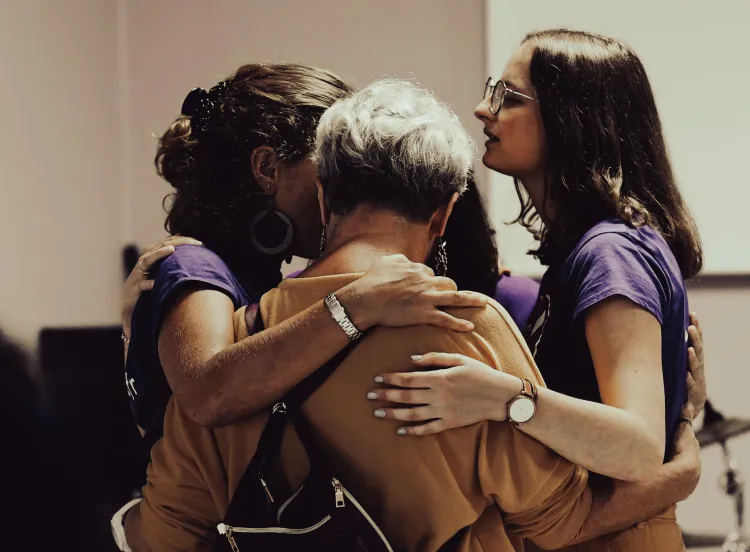Know what to say...

Knowing what to say or do when someone tells you they've experienced sexual violence can feel overwhelming. We all want to say and do the right thing. With help from the NO MORE Community, we've pulled together these scenarios and suggestions for how to respond. But remember, the most important and powerful thing you can do is believe them.
Your male friend tells you that he had an unwanted sexual experience when he was younger with someone he looked up to. He questions if it was sexual assault because he was sexually aroused during the interaction. What do you do?
Some possible options (depending on your comfort and his openness to further discussion) include:
- Offer encouragement for his willingness to consider a challenging question.
- Listen neutrally. Ask him what factors make him think it might have been abusive. Avoid defining what happened to him.
- Explore whether he feels there was a power imbalance in the relationship.
- Offer to help him find resources to learn more about unwanted and abusive sexual experiences for males and why it might be difficult but important for a man to address it.
Do a safety check. See if he has healthy strategies to manage negative feelings when he starts thinking about this question. If not, help him find a hotline or local crisis service should he start to feel overwhelmed.
You’re at a party or out drinking. Someone nearby has had a lot to drink and is being harassed or manipulated by someone you think may do something physically harmful to them. What do you do?
Identify why you’re worried: If you see something that makes you uneasy, identify the behavior that worries you. Is the person you are concerned about drinking too much, and are you afraid they might not be able to say no? Are you afraid that they won’t really be capable of giving consent?
Consider whether to intervene: A situation doesn’t have to be dangerous for you to step in. Ask yourself: How might the situation affect the people who are involved? What’s the possible outcome?
Enlist allies: This is key. There’s safety in numbers. Enlisting allies, like a mutual friend, the bartender, the party host, or a bouncer, can be much more productive and safer than trying to go it alone. Some ways you might handle the situation:
- Consider asking if the potential victim needs help.
- Don’t leave. By remaining present as a witness, the potential perpetrator is less likely to act.
- If you know the potential perpetrator, ask him/her to leave the potential victim alone.
IMPORTANT: If you think intervening will put you in danger at any time, call 911 instead.
You are in the lunchroom with your friends, and a group of students nearby start making sexual gestures and comments to one of your friends who’s sitting with you. Though trying to ignore the comments, you see that your friend is upset. What do you do?
- You could tell the group making the comments to stop their sexually harassing behavior or ask them to imagine how they’d feel if someone made that comment about one of their family members or someone else they cared about.
- You could ask your friend if they want to leave and talk to a teacher or counselor.
Whatever you choose to do at the moment, you should tell an authority figure about the harassment and ask them to intervene. While it’s not physical violence, these types of harassing behaviors help foster an environment that condones domestic and sexual violence in our society.
A co-worker starts talking about a recent high-profile rape or domestic violence case and blames the victim for what happened. What do you do?
- Tell them that it’s never the victim’s fault regardless of what they think happened.
- Give them resources that explain the realities of domestic and sexual violence.
- Contact your human resources representative or immediate supervisor and ask that the staff receive training on these issues.
A teen in your life tells you their boy/girlfriend is hurting them, harassing them, and/or forcing them into sexual situations. What do you do?
- Assure the person that what is happening to them is not right, it’s not their fault, and everyone deserves a healthy, respectful relationship.
- Offer to help them look for local resources to keep them safe.
- Ask them if there is an adult at their school, like a teacher, counselor, principal, or parent, they can talk with to help them stay safe.
- Check in with them to see if they are safe and offer to help them involve individuals resources to help stop the abuse.
The guys on your team are constantly making lewd, rude or degrading comments about women and girls or calling each other names that imply they are “weak like girls.” What do you do?
- Ask the coach to talk to the team or individual about how harassment and the degradation of women and girls is not okay.
- Speak up about their comments degrading their teammates and women, and it’s not cool with you.
- Talk to teammates individually about the situation and ask them not to join in on those behaviors.
- Ask the coach to talk to the team, or individual, about how harassment and the degradation of women and girls is not okay.
You wake up in the middle of the night hearing screaming, crying, yelling, and banging from a neighbor’s house, apartment, or dorm room. What do you do?
- Call 911 and report what you hear.
- If you know the neighbor and can find a time when it is safe to talk to the victim, let them know that resources are available locally to help them.
- Offer to let them use your phone or computer to look up local resources or to contact someone who can help them.
A man you know tells you he was introduced to sex by a female teacher when he was 12 years old. He’s confused because he thinks the experience may have affected his ability to have a healthy relationship, but some people have told him he was “lucky”. What do you do?
Some possible options (depending on your comfort and his openness to further discussion) include:
- Offer praise for his courage to question the “common wisdom” about being “lucky.”
- Listen neutrally. Ask, as an adult, what ways he thinks it would or wouldn’t be healthy for a teacher to interact sexually with a 12-year-old student.
- Ask him what he thinks a healthy relationship would look like in his current life.
- Offer to help him research what impacts on him the experience might have had if it was abusive.
- Help him find local resources to explore his feelings about the experience.
Do a safety check. When considering this question, see if he has healthy strategies to manage negative feelings. If not, help him find a hotline or local crisis service should he feel overwhelmed.
Together We Can End Domestic and Sexual Violence






